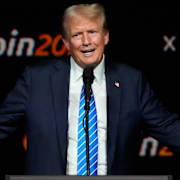
”Bitcoin går upp för att fiatvalutor försvagas”
Bitcoin klättrade för första gången över 125 000 dollar under söndagen. Kryptoinvesteraren Christoffer De Geer, vd för B Treasury Capitals, resonerar i Dagens Industri att det har med nedstäningningen i USA att göra.
– Nu går bitcoin upp för att marknaden förväntar sig att dollarn, och andra fiatvalutor så som euron och kronan kommer att försvagas i längden, säger han.
bakgrund
Fiatvalutor
Wikipedia (en)
Fiat money is a type of government-issued currency, authorized by government regulation to be legal tender. Typically, fiat currency is not backed by a precious metal, such as gold or silver, nor by any other tangible asset or commodity. Since the end of the Bretton Woods system in 1976 by the Jamaica Accords, all the major currencies in the world are fiat money.
Fiat money generally does not have intrinsic value and does not have use value. It has value only because the individuals who use it (as a unit of account or, in the case of currency, a medium of exchange) agree on its value. They trust that it will be accepted by merchants and other people as a means of payment for liabilities.
Fiat money is an alternative to commodity money (which is a currency that has intrinsic value because it contains, for example, a precious metal such as gold or silver which is embedded in the coin). Fiat also differs from representative money (which is money that has intrinsic value because it is backed by and can be converted into a precious metal or another commodity). Fiat money can look similar to representative money (such as paper bills), but the former has no backing, while the latter represents a claim on a commodity or a tradable investment, and can be redeemed to a greater or lesser extent.
Government-issued fiat money banknotes were used first during the 13th century in China. Fiat money started to predominate during the 20th century. Since President Richard Nixon's decision to suspend US dollar convertibility to gold in 1971, a system of national fiat currencies has been used globally.
Fiat money can be:
Money declared by a person, institution or government to be legal tender, meaning that it must be accepted in payment of a debt in specific circumstances.
State-issued money which is neither convertible through a central bank to anything else nor fixed in value in terms of any objective standard.
Money used because of government decree.
An otherwise non-valuable object that serves as a medium of exchange (also known as fiduciary money).
The term fiat derives from the Latin word fiat, meaning "let it be done" used in the sense of an order, decree or resolution.
Omni är politiskt obundna och oberoende. Vi strävar efter att ge fler perspektiv på nyheterna. Har du frågor eller synpunkter kring vår rapportering? Kontakta redaktionen



